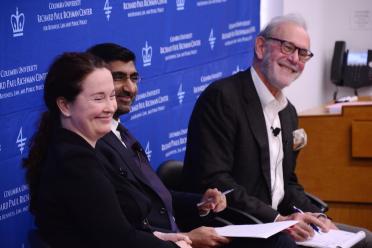
Investing with environmental, social, and governance (ESG) criteria is growing in popularity and visibility, whether it be “socially responsible” with negative screens or “impact investing” with positive screens. As the movement gains momentum, so do questions about its role in the public sector.
At a recent public lecture co-hosted by the Richard Paul Richman Center for Business, Law, and Public Policy and the Columbia Center on Sustainable Investment, panelists aimed to explore some of these questions. The discussion drew opinions from Ronald J. Gilson, Marc and Eva Stern Professor of Law and Business at Columbia Law School, and Carol Jeppesen, Senior US Network Manager at the UN-supported Principles for Responsible Investment (PRI), and was moderated by Aamir A. Rehman, Senior Fellow at the Richman Center.
The Alphabet Soup of Investing
At the heart of the debate stood a central issue: Is investing with ESG criteria consistent with the mandates of public institutions and mission-driven funds? Or does doing so muddle objectives and hurt financial returns? Before diving into the details, Rehman challenged the audience to think about the various terms and definitions involved in this space, from “ESG” to “impact investing” to “socially responsible investing.” He also noted the important distinction between negative screening, in which investors exclude companies that do not meet specific ESG criteria, and positive screening, in which investors actively seek out companies that fit criteria—a fundamental difference in investing practice. Jeppesen echoed the need to untangle the “alphabet soup” of terminology in order to understand the space. To see the glossary provided to the audience, click here.
Both Gilson and Jeppesen underscored that it is critical to make a distinction between concessionary and non-concessionary returns. “Is your investment hurdle that you give up nothing in risk-adjusted returns by adding something that you have been doing all along, or are you willing to take a reduction in return because you think it is worthwhile?” posed Gilson. The need for precise definitions and distinctions underpinned Gilson's view of ESG integration, and was a running theme in the panel discussion. “If you cannot quantify the tradeoff, you cannot measure what you are doing,” he stressed. “And in the end, asset management is about measuring whatever you think you are accomplishing.”
Panelist Perspectives
Jeppesen drew from her experiences working at the PRI, an international investor network originally established by the UN and now operating independently. The PRI's primary objective is to support its signatories in incorporating six investing principles into their work—principles that the PRI defines as “a voluntary and aspirational set of investment principles that offer a menu of possible actions for incorporating ESG issues into investment practice.” Speaking from the PRI perspective, Jeppesen argued that even investors focused solely on profit should consider an ESG integration approach, because “to ignore ESG factors is to ignore risks and opportunities that have a material impact on the returns delivered to beneficiaries.”
Gilson, who explored socially motivated investing at length in “How Investors Can (and Can't) Create Social Value” (co-authored with Paul Brest and Mark Wolfson), noted the need to be wary of how investing practices are marketed. He warned that while achieving value alignment is relatively manageable, impact is extremely difficult and, in public markets, nearly impossible. “When making public investment through trading funds, the impact of your investment will not have an effect on the public fund,” he argued. “All you are doing is trading secondary stocks—one shareholder for another.”
Benefits of ESG Integration
Jeppesen emphasized that the PRI does not ask signatories to forego any return, and relies on the strength of its financial argument. “To ask and require investors to implement responsible investment practices across a broad array of strategies, it has to be something that is helping them as opposed to compromising their ability to generate the best possible return,” she explained. She thus argued that ESG brings overall benefit to investors.
The panelists agreed that one of the values of ESG integration lies in information-gathering. Every industry has ESG-associated issues, and analysts around the world are increasingly interested in measuring the associated risks. At a minimum, ESG screening can lead to awareness of problematic practices that would otherwise not materialize until a negative ESG incident—an oil spill, for example.
Challenges in ESG Integration
Turning to the limitations of ESG integration, Gilson stressed that the practice requires active management and information that can be trusted—two things that are not easy or inexpensive to obtain. “Information efficiency,” in his words, is the key to not only being successful in this space but also to protecting investors.
Jeppesen agreed, noting that responsible investment strategies require an investment in resources. She encouraged stakeholders to look to their peers as well organizations like the PRI for support and information, noting that many participants in the ESG space are actively sharing lessons and advice.
Advice and Questions
Prompted about advice to stakeholders, Jeppesen stated that investors should always think critically about the future of different industries and products. It is helpful, she noted, to keep in mind the oft-repeated disclosure shared by financial advisors: “Past performance does not guarantee future results.”
Gilson concluded that while there is a place for value-alignment in investing, its objectives and limitations need to be well understood. He also cautioned that asset managers should not overstate the Edge their funds may have.
At the end of the discussion, audience members asked questions about screening procedures, the specifics of measuring impact, the development of quantitative metrics and other tools for ESG integration, and the state of ESG integration around the world.
